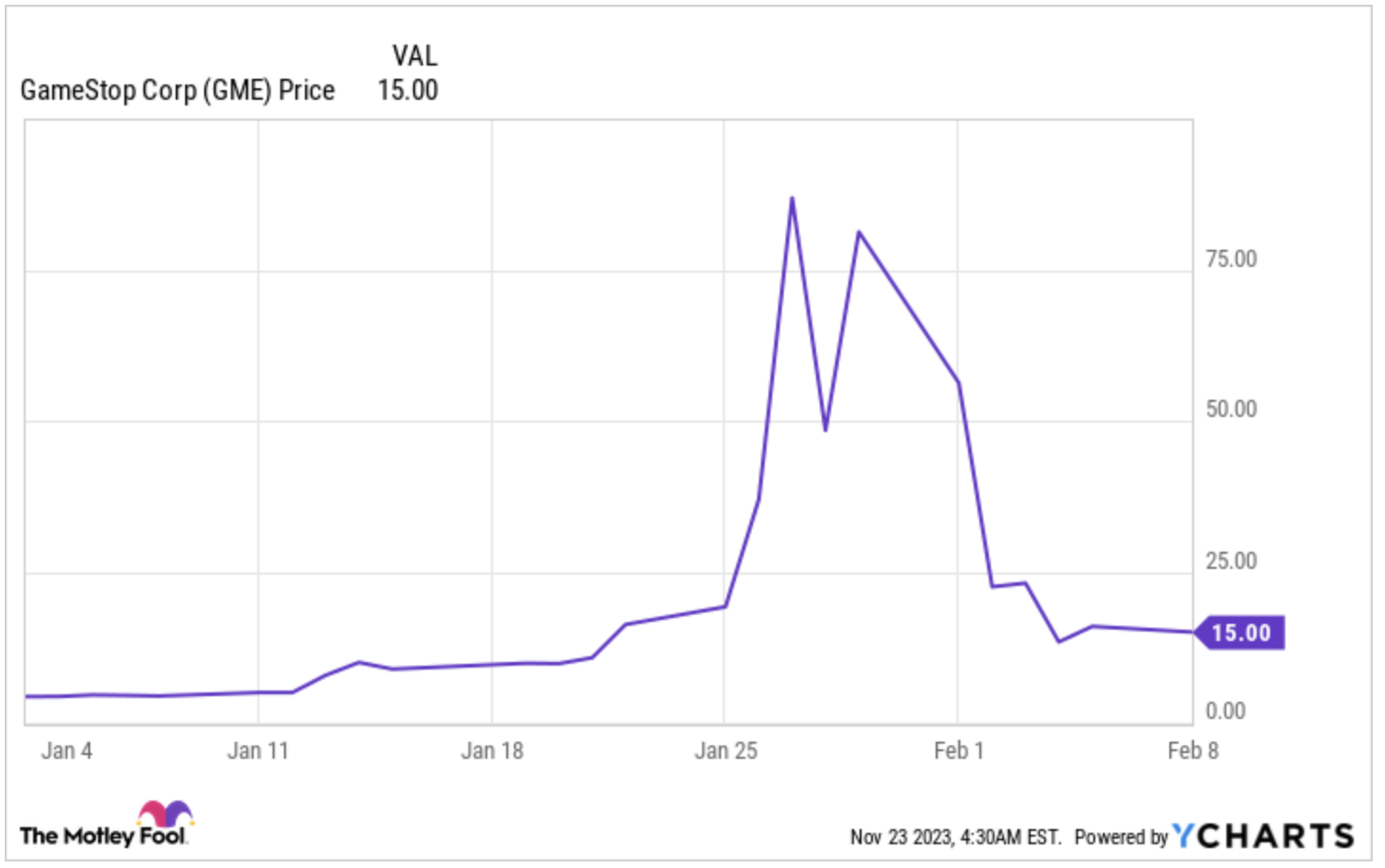GameStop, How Reddit Users Brought Wall Street to its Knees
GameStop, How Reddit Users Brought Wall Street to its Knees
Keith Gill, aka RoaringKitty and DeepFuckingValue, was a financial analyst and online trader who challenged Wall Street with GameStop, a retailer on the verge of bankruptcy. He shared his trades on Reddit, attracting a crowd of followers who bought GameStop shares, driving up the price and hurting hedge funds that had shorted the stock.
In today’s episode, financial journalist Iona Bain and I look at how the GameStop saga stands as a testament to the potential impact of individual investors challenging established norms, and the key things investors can learn from this rollercoaster of a story.
***
You can listen (27 min) and subscribe here:
***
Who is keith gill?
It’s 2019 and our protagonist is Keith Gill, a 33-year-old financial analyst, who began his notorious journey under the username DeepFuckingValue on Reddit's WallStreetBets forum in 2019. WallStreetBets, a subreddit with over a million members, gained fame for its unconventional approach to investing, often betting up the prices of meme stocks—volatile stocks fuelled by viral attention and memes. GameStop became a prime example of this.
Keith shared his trades, portfolio screenshots, and investment strategies, attracting a substantial following online. Known for his live sessions on YouTube (using the name RoaringKitty), he discussed trades while sipping beer and wearing a red bandana, Keith positioned himself as an old-fashioned value investor—seeking overlooked companies in the stock market's bargain bin. The term "bargain bin" is a metaphorical way of describing stocks that are perceived to be undervalued or overlooked by the broader market. It implies that these stocks are like hidden gems that may not be getting the attention they deserve.
However, Keith Gill was not unique in his outlook - in fact, he was taking his cue from some much better-known investors in the US, like Michael Burry.
What is short selling?
“The heart of the GameStop phenomenon was the short squeeze orchestrated by WallStreetBets. As the subreddit urged followers to buy GameStop shares, triggering short sellers to cover their positions, the share price skyrocketed. Hedge funds faced substantial losses, with some estimates suggesting losses in the billions. ”
Michael Burry gained widespread recognition for his prescient bet against the subprime mortgage market leading up to the 2008 financial crisis. His success in predicting the collapse of the housing bubble and subsequent financial turmoil was detailed in Michael Lewis's book "The Big Short," which later became a film adaptation featuring Christian Bale as Michael Burry.
Fast forward to 2019, and Michael Burry once again found himself in the midst of financial intrigue. This time, his attention turned to GameStop, an American brick-and-mortar retailer specializing in video games, consumer electronics, and gaming merchandise. Burry identified a situation where large institutional investors and hedge funds were heavily shorting GameStop stock.
Short selling is essentially a technique often employed by hedge funds, lies at the heart of the GameStop saga, showcasing both its potential benefits and contentious nature. Hedge funds, entrusted with managing substantial sums for wealthy clients, leverage various techniques to maximize profits, taking risks with a certain level of flexibility granted by their clients.
Short selling involves borrowing shares and selling them with the anticipation that their price will decline. The goal is to repurchase the shares later at a lower price, securing a profit on the difference. This method is akin to betting against a company, a practice criticized for its seemingly negative impact.
Advocates argue that short selling can serve a valuable function in the market. It acts as a corrective force, hastening the demise of poorly performing companies and preventing overvaluation. By signaling that a company may be overpriced, short selling can contribute to a more realistic market valuation.
However, the controversy arises from the potentially severe consequences of this practice. Short selling can lead to job losses and negatively impact the real economy, as profiting from a company's decline may result in its ultimate failure. The ethical dilemma becomes more pronounced when considering that short selling is primarily a means for wealthy investors to accumulate more wealth.
Moreover, short selling is not without risks, and these risks are notably different from conventional investment approaches. While typical investments carry the risk of the investment losing value, short selling exposes investors to unlimited losses. This inherent risk adds an extra layer of complexity and danger to this method of trading.
Back to Michael Burry: he was known for his contrarian views and saw potential in GameStop, believing that the company had been unjustifiably targeted by short sellers. Another investor, Ryan Cohen, joined the cause by acquiring a significant stake in GameStop and later securing a position on the board.
Keith Gill, closely observing these developments, echoed the sentiment that GameStop was undervalued due to excessive shorting by hedge funds. Encouraged by this, he invested $53,000 of his life savings in GameStop in June 2019.
Gamestop and the short squeeze
The WallStreetBets community, known for its irreverent approach to investing, rallied behind the idea of causing a short squeeze, where rising stock prices force short sellers to buy shares to cover their positions, further driving up the price. Retail investors began aggressively buying GameStop shares. This sudden surge in buying activity drove up the stock price rapidly.
The increasing demand for GameStop shares, coupled with short sellers rushing to cover their positions, led to a classic short squeeze. This is a situation where short sellers, facing losses, are forced to buy shares at higher prices, amplifying the upward momentum. Keith's investment allegedly swelled to nearly $40 million, while Elon Musk's tweet further fuelled the frenzy by directing attention to the WallStreetBets community. Musk's endorsement accelerated the rise in GameStop shares, soaring from $18 to over $500.
Moreover, the rapid and unexpected rise in GameStop's stock price created significant market volatility. Media coverage intensified, drawing attention to the power of retail investors and the potential risks faced by hedge funds employing aggressive short strategies.
Hedge funds, meanwhile, faced substantial losses, with some estimates suggesting losses in the billions.
The backlash
As GameStop's fortunes shifted, a wave of retail investors exited, resulting in widespread financial losses. Additionally, the momentum of the GameStop revolution faced obstacles when Discord removed the WallStreetBets server, citing hateful content. Robinhood, a popular trading app among retail investors, suspended the ability to buy GameStop shares, leading to accusations of protecting hedge funds at the expense of retail investors. These events triggered a backlash from both politicians and the investing community, fuelling the narrative of a rigged system.
In February 2021, Keith Gill faced a lawsuit alleging that he violated securities laws by manipulating GameStop's stock price through social media. He testified before the US House Financial Services Committee, denying any wrongdoing. Ultimately, the lawsuit was dismissed in April 2022. However, the fallout extended beyond Gill. The insurer MassMutual, Gill's former employer, agreed to pay a $4 million fine as part of a settlement with regulators.
The GameStop craze also prompted a broader industry shift. After witnessing hedge fund Melvin Capital lose billions by shorting GameStop and eventually shutting down in 2022, other hedge funds began closely monitoring social media platforms like Reddit for potential market-moving trends.
While the GameStop saga brought regulatory scrutiny to the practice of short selling, significant changes have been limited. Some hedge funds, like Melvin Capital, suffered significant losses, but others, such as BlackRock profited.
The aftermath also revealed numerous stories of individual retail investors who, drawn to the GameStop phenomenon, entered the market late and lost substantial portions of their savings. This serves as a reminder that, amidst the sensational headlines, the full story might not always be clear, and practicing caution is wgeb navigating the complexities of the stock market.
To the Moon and Back.
Key reflections
Amid the chaos and controversy of GameStop, certain fundamental principles of investing stand out, and here are the key takeaways:
Value Investing Endures:
The GameStop story underscores the enduring value of a traditional investment strategy known as value investing. This strategy involves identifying companies that the market has written off but still hold potential for a turnaround. Notably, this approach mirrors the long-term success of renowned investors like Warren Buffett.
Patience Pays Off:
One of the central lessons from the GameStop saga is the importance of patience in investing. While WallStreetBets and similar communities sought quick gains, the historic success of investors like Buffett is rooted in the long run. Patiently waiting for at least five years allows investments to weather market fluctuations and has historically shown a higher probability of generating returns.
Save Before You Invest:
The distinction between saving and investing is crucial. In a world where market returns might not match those seen in the past, advocating for saving before investing becomes pertinent. Saving ensures a financial cushion and eliminates the risk of losing all your money in the volatile world of investing.
Diversification is Key:
The GameStop frenzy also highlights the importance of diversification. While the allure of a single high-profile investment can be tempting, spreading investments across different assets helps manage risk. Diversification guards against the impact of a single stock's unpredictable fluctuations.
Awareness of Market Realities:
Investors should be aware of the realities of the market. While the GameStop episode showcased the potential for retail investors to disrupt traditional dynamics, it also brought attention to the risks associated with speculative trading and the need for regulatory scrutiny.
Balancing Risk and Reward:
While investing inherently involves risk, understanding and managing that risk is essential. The GameStop saga exemplifies the fine line between reward and risk, and investors should be cautious about following speculative trends without a thorough understanding of potential consequences.
****
RESOURCES:
Iona Bain is an award-winning journalist, broadcaster, speaker and author, and is the UK’s go-to voice on millennial money. She is BBC Morning Live's resident financial expert.
Follow Iona Bain on Twitter @ionayoungmoney
Instagram @ionajbain
SPONSOR:
Thank you to our partner PensionBee: combine, contribute and withdraw online. Take control of your pension, so that you can enjoy a happy retirement and join 223,000 customers saving with PensionBee. When investing, your capital is at risk. Investments can go down as well as up, and you may get back less than you invest.
OTHER EPISODES OF BANKING BAD:
#1 Brooke Astor, and When Financial Abuse Hits Home
#2 Tulip Mania, The Greatest Bubble Story of All Time
#3 How I Ended Up £250,000 in Debt
#4 Surviving the Dotcom Bubble with Martha Lane Fox of Lastminute.com
#5 GameStop, How Reddit Users Brought Wall Street to its Knees



